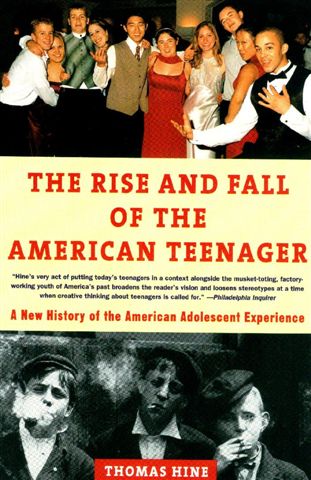Because I have merged the format of Quotes and Reflection I have chosen
to work with only two quotes so that I may explore them more in depth while
still maintaining a reasonable word count.
’Maybe I’m something special, and
maybe I’m not. Maybe I’m here for a reason and I might be going somewhere after
this, but then again I might not. I wonder where I fit in?”…Figuring out where
they fit in—to the universe, the world, the economy, their social circle, their
family, is a project on which teenagers spend a lot of their time and energy…study
after study suggests that teenagers’ principal preoccupation is to adapt, to
find a place in life. (2)
Thomas Hines, in his introduction
to The Rise and Fall of the American
Teenager, quotes his younger, seemingly angstier, self as a way to
personally connect with the studies that he alludes to (these studies that talk
about how teenagers are constantly on a quest to “find themselves”). He does so
not to prove that these students are right
but rather to highlight ways in which our teenage self isn’t a completely
different entity from our grown-up self. This is the same idea that we address
with our third course assumption: Teenagers are not some alien life form.
 On a personal level, the thoughts
that Hines quotes from his younger self are thoughts that are constantly
running through my mind. I am always wondering what the goal of my existence
is, if I will become “something” if I will “be somebody”. The fact that these
thoughts are constantly running through my head does not expose me to be
stunted but rather it shows that I am human. I am a human who has grown up in
this Western society. Let’s take a look at some of the “greatest” writers (I
put “greatest” in quotes because there is always a question of how and why some
authors are canonized and others are not, but that is not a relevant train of
thought for this post) and philosophers: are not most, if not all, of them in
some sort of perpetual
existential crisis? Are these
thoughts that Hines quotes not the thoughts that run/ran through their head
constantly and served as major themes for their work? And yet somehow we have
decided that it is only teenagers who are on a quest to find themselves when,
in reality, we are all on the same quest.
We live in an individualistic society, which not only means that we lack a
sense of community with each other; it also means that we see ourselves as
individual, independent, beings with personality and thoughts that mean
something. Given that we identify ourselves as individuals first and community
members second (or never) we, of course, are then always trying to figure out
just who exactly we are. This is not a teenager crisis, it’s a human crisis.
On a personal level, the thoughts
that Hines quotes from his younger self are thoughts that are constantly
running through my mind. I am always wondering what the goal of my existence
is, if I will become “something” if I will “be somebody”. The fact that these
thoughts are constantly running through my head does not expose me to be
stunted but rather it shows that I am human. I am a human who has grown up in
this Western society. Let’s take a look at some of the “greatest” writers (I
put “greatest” in quotes because there is always a question of how and why some
authors are canonized and others are not, but that is not a relevant train of
thought for this post) and philosophers: are not most, if not all, of them in
some sort of perpetual
existential crisis? Are these
thoughts that Hines quotes not the thoughts that run/ran through their head
constantly and served as major themes for their work? And yet somehow we have
decided that it is only teenagers who are on a quest to find themselves when,
in reality, we are all on the same quest.
We live in an individualistic society, which not only means that we lack a
sense of community with each other; it also means that we see ourselves as
individual, independent, beings with personality and thoughts that mean
something. Given that we identify ourselves as individuals first and community
members second (or never) we, of course, are then always trying to figure out
just who exactly we are. This is not a teenager crisis, it’s a human crisis.
This lengthy waiting
period has tended to reduce young people’s contacts with older people and
increase them with people who are exactly the same age. That, in turn, has led to
the rise of a youth subculture that has helped define and elaborate what it
means to be a teenager (7).
The lengthy waiting period Hines
is talking about is the “long period of education, exploration, and deferred
responsibility” (7). Teenagers are in school longer than their predecessors
(or, rather, their predecessors’ predecessors); they are less likely to be
expected to work, and generally when they do work they are employed at places
that aim to hire teenagers; and they are expected to be on the aforementioned
existential journey to find themselves. All of these factors lead to less
cross-over with non-teenagers and so teens are often surrounded by their peers, resulting in "youth subculture".
Now,
just because I can summarize Hines’ argument does not mean I agree with it
fully. This point of his is perhaps the point that makes it the most obvious
that his usage of teenager actually means middle-class White teenager.
Depending on one’s social class and situation it should not be expected that
they 1) will not be working and 2) will have less interaction with those older
than themselves. This does not take in account the families who live in a
household with multiple generations (and thus are not only spending time with
people a bit older than themselves but with those who are FAR greater in age).
A teenager who has to help support the family does not have the luxury to only
choose a job that allows them to essentially shoot the breeze with other teens.
They will be on the hunt for a job that best suits their needs and their
schedules, regardless of the age and life circumstance of their co-workers. And
having to be a pillar of support for the household tends to mean lots of work
hours, and if this teen is a good student then they certainly do not have all
that much time to spend hanging out with other teens. Free time is a luxury for
many teenagers. I’m not saying that what Hines posits is wrong but rather that it just does not take enough different
factors into account. He should have made a disclaimer or made a less
generalizing claim, but because he did I feel that it is our duty to take him
to task for that (even if it is simply on our blogs and in class). In general,
in class I would like to further discuss the ways in which Hines makes it clear
that the “teens” he talks are about are middle class White teens. Middle class
White teenagers is a shrinking group, there is no reason why texts should still
use them as a norm, and no reason why we should accept that norm willingly.
On a personal
level, I have to wonder if some of these things are why I often feel a bit of a
disconnect with my peers. I’ve been working since I was 13 and had 3 jobs at
the age of 15. Due to various personal life circumstances I did not have the “typical”
(again, what is “typical”, really?) teenage experience. This idea of the “teen
subculture” is so prevalent that those who existed outside of said subculture
are at a bit of a loss with their peers. That doesn’t make those of us who had
different teenage experiences any less of a “teenager”, it simply means we didn’t
have the expected teenage life. And in these changing times, how many people are
actually having the expected teenage experience? What is the “teenage
subculture” truly? Can we simply give it such a general name when the
subculture may vary by race, region, etc? And, by implying that there is a
shared “teenage experience” aren’t we furthering the feelings of confusion,
angst, un-belonging, for those teenagers who exist outside of said experience?


No comments:
Post a Comment